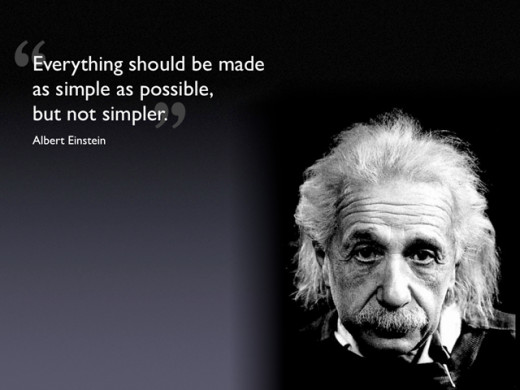The Art Of Simplicity

The Art Of Simplicity
July 8, 2013
Winston Wayne Wilson
@wwaynewilson
One of the most underrated, yet most powerful, words in the English language is simplicity. Simplicity gets a bad rap; however, it possesses the key to solving many complex problems. It also possesses the keys to the front doors of many of the elusive utopias we aspire to live in, like happiness and peace of mind.
A friend of mine recently told me about a theory of simplicity, called Occam's razor, which is a theory of logic and problem-solving that essentially postulates that, given two or more competing assumptions or hypotheses, the simplest one (i.e. the one with the fewest assumptions) is typically the correct one.
Also, scientists, like Einstein, have understood and attempted to leverage the power of simplicity for many years. In the book, “The End Of Science: Facing The Limits Of Knowledge In The Twilight Of The Scientific Age”, John Horgan contends that scientists sometimes evaluate whether a theory is right based on whether it is “elegant” or “beautiful”. If a theory was too cumbersome or convoluted, i.e. not simple enough, they would say that it was not “elegant” or “beautiful” so it could not possibly be right. By that definition, they would look at E = mc2 and say, “Wow, how simple, how elegant, how beautiful, it must be right!” And, as it turns out, they would be right that the theory is right. Now, that might sound like a dumb way to evaluate a scientific theory but maybe there is something there.
Science aside, we have a love-hate relationship with simplicity. On the one hand, we feel sorry for people who are deemed to be simple minded simpletons or people in third world countries with simple lives that are devoid of modern luxuries like cars, flat screen TVs, IPhones, Sealy Posturepedic mattresses and Starbucks flavored coffees. On the other hand, when the complexity of our modern, sophisticated lives grinds us into the ground, we surreptitiously fantasize about having simpler lives. But how does one integrate simplicity into his or her life without, well, making it too simple? The answer lies in the Einsteinian wisdom of making everything “simple as possible but not simpler.” This requires that we find that ”Max-Min” line that lies between simple enough and too simple, where we get the maximum utility out of simplicity while minimizing its negative side effects. But how exactly do we do that?
Let me illustrate the concept of finding a Max-Min line between simple and too simple. Here is a sentence, containing thirty six words, that is way overdone and can be simplified: “The mockingbirds, in the sky with the clouds that look like they are about to pop any second now and, unfortunately, I don’t have an umbrella because I left it in my new car, are beautiful.” The sentence could be simplified to, “Mockingbirds are beautiful”, and, after deleting thirty three inane words, I have not lost the key message being communicated, which is that mockingbirds are beautiful. The sentence is now “simple enough.” If I took one step further and delete the word “beautiful”, I would get, “Mockingbirds are”, which no longer conveys the same message. The other two word variation, “are beautiful”, also does not convey the same message. None of the one word variations would convey the same meaning either. Hence, the Max-Min line of simplifying the sentence, without making it too simple, would be achieved when I reduce it by thirty three words to arrive at “Mockingbirds are beautiful.”
In our culture, nothing seems simple because we are overwhelmed by choices. In addition, we tend to over-do many things: We over-communicate; over-expect; over-think; over-eat; and over-spend. In this article, I will use these five things to illustrate how we can identify the Max-Min points and, possibly, achieve greater simplicity and, perhaps, more happiness and peace of mind.
- Over-communicating. Believe it or not, just like that verbose thirty-six-word sentence above, every day we communicate too much information (“TMI”) at work, at home and in our communities. Specifically, we spend a lot of time telling people a lot of things that convey very little meaningful information about us. So, for all the talking we are doing, we still wind up being misunderstood. To simplify communication, so that it is simple enough but not too simplistic, we should focus on our deal breakers and our values. When we first meet our significant others, for example, we talk about what we like to do and we inundate them with our past, our dreams and our fantasies. However, we rarely specifically tell them what our deal breakers are (like mismanagement of finances or the lack of shared religious or moral values or the lack of physical intimacy). Also, we rarely tell them what our values are. You would think that, if you are trying to negotiate spending a lifetime with a person, you would want to know what his or her deal breakers and values are. We tend to find out what the deal breakers and values are during the scream fest at the end of the relationship. Similarly, at work we rarely communicate our deal breakers or values. For example, when supervisors provide guidance, they tend to over-communicate. They will say twenty things but none of them include deal breakers like missing certain deadlines or failing to immediately communicate when something goes wrong. For any relationship to work, the other party must know what the deal breakers and values are. To find the Max-Min line in your communication, think about some of the key people you interact with and ask yourself whether they know your deal breakers and your values. If not, then start to delete inane communication with them until you get down to your version of “Mockingbirds are beautiful”, which represents a clear, more easily understood, message about your deal breakers or your values. The simpler your communications are, the better chance there is that people will be able to give you what you need. If you don’t know what you want, others will not either. So, you might want to spend some time with yourself to figure out your deal breakers and values.
- Over-expecting. One of life’s greatest heartaches comes from being let down or disappointed by others. The problem, however, is not that people are horrible creatures. The problem is that we tend to over expect perfection from people. People are perfect when we don’t expect them to be perfect. Simplify your life by simplifying your expectations of people. Rather than wanting fifty things from fifty people focus on wanting five things from five people. By the way, bear in mind that the primary purpose of people is for us to share our passions with them – they are not there to simply please us or do things for us. To find your Max-Min point in terms of what you need, and from whom, you have to ask yourself what do you really need from your interactions with people and find five people in your life who can best fulfill those needs. If humor, sports, music, politics and nature are the five most important things in your life, then find five people who really dig these things and spend the majority of your time with them. However, have no expectations of them other than that they share your five passions. If they suck at finance, they are out of shape, or they are not of your religious persuasion, leave them alone. You can only expect five things from them. You must take what they can offer and that’s it. This approach will increase your overall satisfaction when you interact with these five people. If five people don’t do it for you, then you might have gone below your Max-Min point and you might need to incorporate one or two more people. However, if you get the same amount of satisfaction with four people but not with three people, then four people sharing your five passions is your Max-Min point in achieving simplicity with respect to your expectations of people.
- Over-thinking. Over-thinking is one of our favorite pastimes. Analysis to paralysis cripples more minds per day than can be counted. We think people are out to get us, we might lose our jobs, the neighbors hate us, there is a conspiracy brewing in the US government against us, we’re gonna go bald, lightening is going to strike us, our kids don’t like us, we are going to fail at whatever we try next, we’re gonna hit a deer, our significant other is cheating, our friends think we’re fat and so on. Now, all these things might very well be true; however, all these worrisome things are not of equal importance and we cannot battle all of them at once. If we do, we will fail at fixing anything. In the publishing world there is the expression, “If everything is emphasized, nothing is emphasized.” When we over-think, we put all our thoughts and fears in capital letters or italics. When all our thoughts and fears are being emphasized, with equal importance, then we never get to a solution. Rather, we fall into a circular logic where we are not willing to deemphasize anything. When we over-think things everything is a “Yes”. According to David Don Rockwell, sometimes we have to say “No” to a few options so that we can find that solitary “Yes”. Finding the Max-Min point in negotiating or solving a problem, is like buying a house and finding the maximum price that we are willing to pay without breaking the bank and the minimum price that the seller is willing to accept and still break even. Hence, rather than over thinking everything, we have to focus on what is most important. For example, do we care more about losing our jobs or about whether there is some government conspiracy targeted at us? On the laundry list of concerns I mentioned above, maybe only three things really matter. Focus on doing something to alleviate your anxiety about just those three things. If fixing three things still leaves you anxious, then keep fixing one additional thing until your blood pressure normalizes. At that point, you will have arrived at your Max-Min point of simplicity.
- Over-eating. Over 15,000 years ago, Paleotheic man had one primary reason to eat: for survival. He had to run around endlessly to hunt for food for himself and his family, while fighting off others who tried to steal his food. He barely had enough time to eat it before he had to wake up and hunt again. Today we have the luxury of eating for nurture, nourishment, nostalgia, or numbing. When we feed our bodies for nurture, we are focused on feeding our bodies the vitamins, minerals, water, fruits, vegetables, proteins and legumes that it needs to deliver peak performance. When we feed our bodies for nourishment, we are giving it just enough for it to survive but we might be deficient with some key nutrients. However, we are neither pampering nor abusing our bodies – we are simply playing our feeding by ear rather than actively watching what we eat. When we feed our bodies for nostalgia, we are focused on honoring memories around foods based on our cultures, upbringing or some other specific experience. Vitamins and nutrients are not the focus. When we feed our bodies for numbing, we are focused on quelling emotional pain associated with past experiences, fears, stress or a number of other adverse experiences. Vitamins and nutrients are also not the focus. We simplify eating, and find our Max-Min point, when we reduce the number of reasons for eating and focus on the most important thing that we are trying to accomplish with food. If we truly desire a body that is healthy, and that can help us to deliver peak performance, then we should feed ourselves for nurture. Eating becomes complex, and overdone, when we max out on eating for nostalgia or numbing. Eating only for basic nourishment would be getting to a point of being too simple.
- Over-spending. The average savings account in America has $0 in it. One out of every three Americans also has $0 in his or her retirement account. After working for over forty years, many of the 401(k) accounts of 65 year olds barely have $400,000 in them, instead of the $1.0 to $2.6 million range that some financial experts suggest. What happened to the money? Well, we either are not making enough money to hit those targets or perhaps a more plausible explanation is that we simply spent it. Charles A. Jaffe remarked that, “It’s not your salary that makes you rich, it’s your spending habits.” There are many places that Americans fantasize about living. Living within our means is not one of them. That is why our focus is on making more and more money. To simplify our spending habits, we have to focus on what is most important to us as it relates to money. Do we want to save our money to achieve financial security for ourselves and our families or do we want to spend it to keep up with the Joneses? We find our Max-Min point with spending by first doing a budget and negotiating every single item that we are spending our money on. Cut out as many discretionary items as possible until your budget is lean enough but not emaciated. In the immortal words of Dave Ramsey, “We buy things we don't need with money we don't have to impress people we don't like.” Whatever money you are spending to impresses the Joneses is money that you should redirect to your 401(k) and other investment accounts.
So, there you have it. Finding your Max-Min point of simplicity can be applied to just about anything. My challenge for you today, is to start becoming aware of when you are complicating your life by over-doing things. Always ask yourself, “Is there an easier way for me to do this?” Sometimes we make things more complicated than they need to be without producing better results. Also, don’t forget to say “No” to a few options so that you can find your, “Yes”. Enjoy our week.





